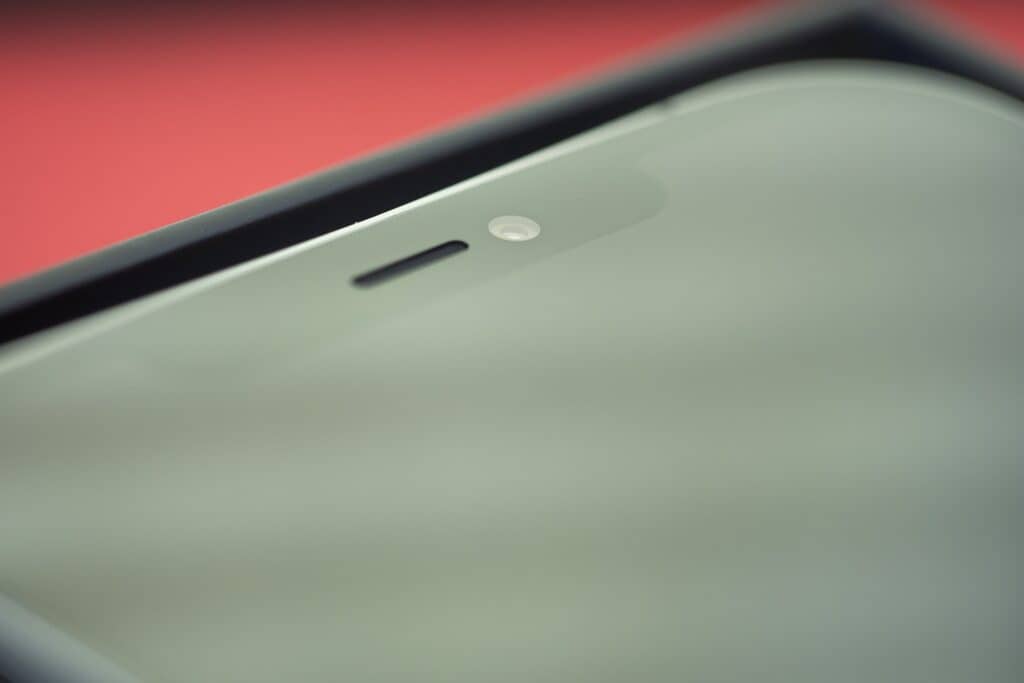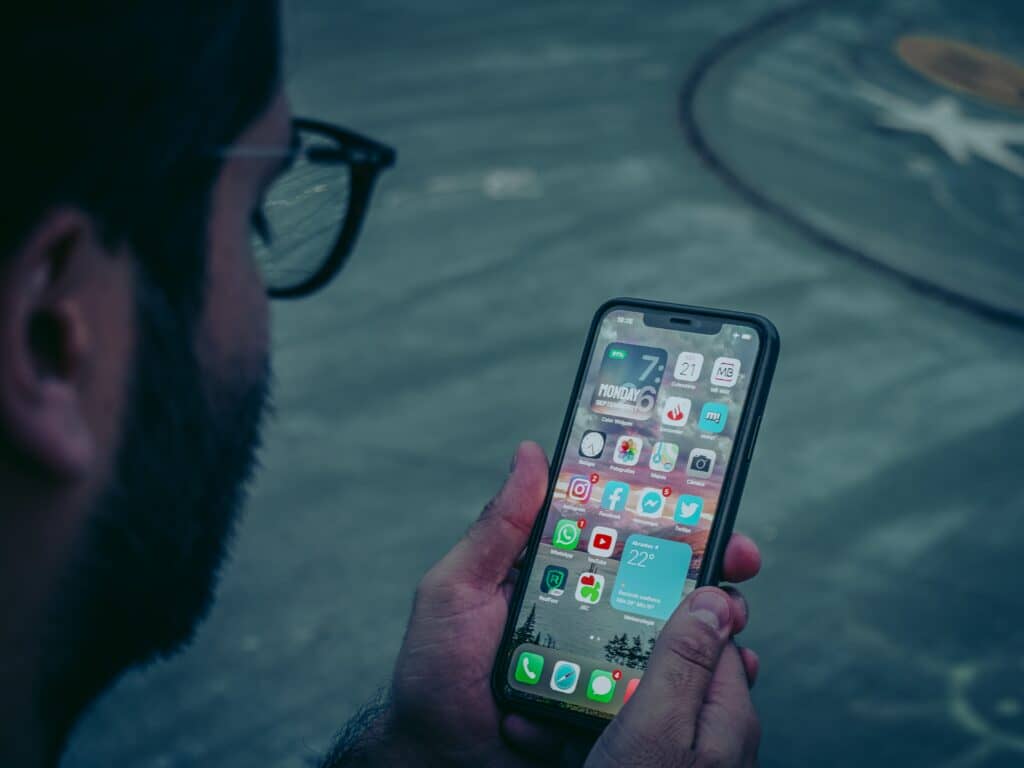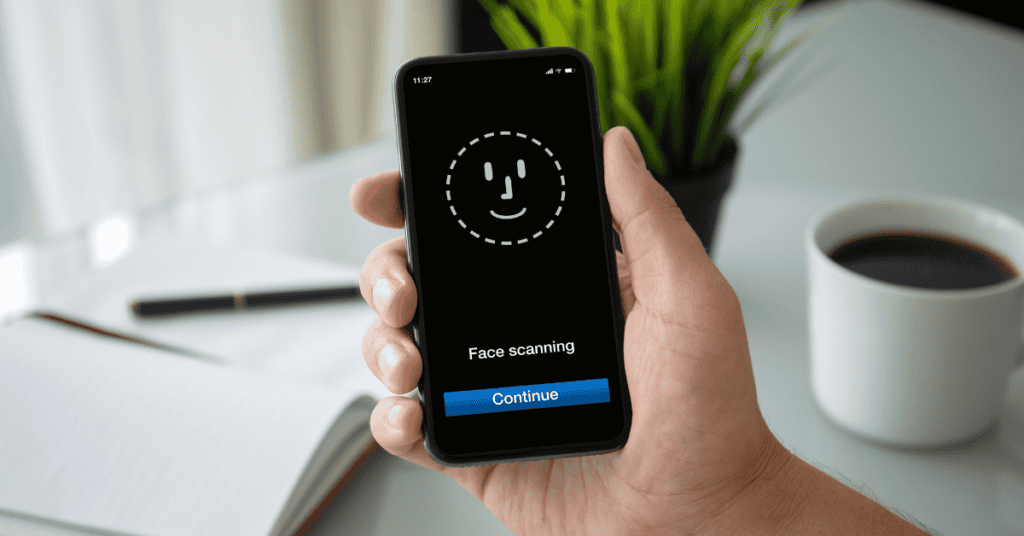Face ID first saw the light of day in 2017 when it was released in the iPhone X, replacing the semi-successful Touch ID fingerprint scanning that was present in previous models.
The current iPhone 13 series still features the same Face ID technology- as will upcoming versions of Apple’s signature product for the foreseeable future.
Face ID works by scanning your facial features using the TrueDepth camera system to determine whether it should unlock the phone and allow access.
It is an extremely efficient form of authentication, and it has been shown that face scanning is around 30% faster than its fingerprint counterpart.
However, many users feel a sense of unease when faced constantly with a camera that can recognize their faces.
For them, the question remains: Is Face ID always on?
Technically speaking, Face ID scanning is activated only when you tap the screen to scan your face and unlock your iPhone.
Apple also has stated that the feature will work only when you face your phone directly.
However, the fact remains that the TrueDepth camera is actually always on- even if you aren’t looking at the phone!
This means that Face ID is always turned on in a sense, even though it won’t unlock the iPhone unless you specifically want it to.
Is Face ID Constantly On?

To understand whether Face ID is “constantly” on, it’s helpful firstly to learn more about the technology behind the iPhone’s face-scanning capabilities.
How Face ID Works
Apple’s TrueDepth camera system consists of cameras, sensors, bionic chips, neural networks, and a dot projector at the top of the phone.
The TrueDepth camera is an infrared (IR) camera that takes pictures while the dot projector shines 3000 dots of invisible IR onto the face.
The IR image and dots are then sent to the neural networks to create a 3D virtual model of the face using mathematical equations, after which they are used to check if the person trying to unlock the phone is the same as the image is stored in the system.
If the images match the system, the phone will become unlocked. However, if three wrong attempts are made, Face ID will automatically be disabled to prevent forced access. The system will then ask for a password confirmation before unlocking the device.
The entire process takes place in real-time, and the TrueDepth camera also has a flood illuminator built in to detect your face in dark surroundings.
Face ID is comprehensively designed so that it can also recognize the owner even if they look a little different (or have gained a little weight- guilty).
For example, wearing makeup, having a different hairstyle, or growing out that facial hair for Movember will still allow a person to be recognized as the same individual who owns the phone.
While we may take this for granted, it wouldn’t be very helpful at all if your iPhone couldn’t recognize you simply because you don’t look exactly the same every time!
That’s All Well And Good… But Is Face ID On All The Time?
Apple has made it clear that you need to face the screen and keep your eyes open in order to unlock an iPhone.
However, the TrueDepth camera also has another purpose of being able to activate Attention Aware features that improve user experience.
Functions such as dimming of the phone display when looking away and reducing the volume of alerts when you are looking at the screen are carried out using Attention Aware, which tracks your movements through the cameras and sensors.
So, we can conclude that while Face ID will be activated only when you want to unlock the phone, the TrueDepth camera and the sensors by which it operates are always on and following your movements.
If the idea of this creeps you out, you can thankfully turn off Attention Aware on your iPhone or iPad to prevent this from taking place.
It might be a good move to do so too, as privacy is not something that can truly be guaranteed- even if Apple is clear that any face data gathered by your phone will be highly encrypted.
Can I Turn Off Apple Face ID?

Apple asserts that it has programmed the Face ID algorithm by using a billion images from across the globe, making it as secure as possible.
The company is also confident that another person would not be able to unlock your phone just by using a photograph.
They have admitted however that the machine learning algorithm did get confused by identical twins (which, to be honest, we can’t really blame it for).
That’s all very nice, but what if you just don’t want to use Face ID or enable the Attention Aware feature?
Can you turn off Face ID on your iPhone?
The Answer: Yes, you can disable and turn off Face ID on your iPhone.
Here are different ways to do it:
Through The Settings
- Go to Settings -> Face ID & Passcode

- Enter the password and Slide the toggle from green to gray for all options under Face ID.

Via Siri
This method only temporarily disables the Face ID. It’s handy in a pinch when you don’t have enough time to make changes to the overall settings.
Keep the phone locked and ask Siri, “Hey Siri, whose phone is this?”
That will result in Face ID being disabled for the time being, and a contact card will show up on the screen.
Face ID will be activated once again after you correctly enter the login passcode.
Using The Volume Button
This is also a temporary method to disable and turn off Face ID.
Keep the phone locked. Press and hold the side button (volume up/down) for a few seconds. Tap Cancel when the word shows up on the screen.
This will disable Face ID and request input of the passcode in order to unlock the phone. Face ID will once again be activated when you unlock the phone.
What Are Some Privacy Risks Of Using Face Recognition Software?

Facial recognition technology is becoming a bigger and bigger part of our lives. This is no doubt advantageous in many ways, and unlocking iPhones using Face ID is not anything new.
Increasingly, facial recognition technology has seen use by social media sites and is a part of surveillance cameras as week.
However, are we sufficiently knowledgeable about all of the potential risks that perhaps accompany the convenience?
Data Security
The biggest issue on many of our minds is this: Just how secure is our data with the tech giants?
In an era of powerful cameras and advanced technology, it’s impossible to be 100% sure about who is using our data and for what exact reasons.
Faces cannot be encrypted, and excessive use of facial recognition technology can lead to identity theft, harassment, and worse.
And even though we’re assured of supposedly impenetrable security at every turn by every major actor, the reality is that we can never be 100% sure that their database is invulnerable.
After all, every tech giant to date has been a victim of a cyberattack to some degree.
Privacy And Individual Rights
Given that modern facial recognition technology can detect a person even if they are wearing a mask or when the images are blurred, it leads to the question of just how private our lives are.
Nowadays, there is less and less of a choice when it comes to remaining anonymous and not being identified in public.
While this is a definite plus in terms of crime prevention, it also puts innocent people at risk of having their entire life tracked and recorded.
What if this information is misused by someone with more nefarious intentions? Doesn’t an individual have the right to keep their life as private as they want?
Minimal Transparency
One of the biggest qualms about how all of this operates is the complete lack of transparency in the regulations and permissions of the companies that collect our information.
Businesses using facial recognition software don’t always ask for permission from people to collect specific information, often opting for an ‘act-first, apologize for later approach.
It’s also somewhat of a mystery when it comes to exactly what happens with the data that is gathered!
In Summary
In response to the question, “Is face ID always on?” The answer is No.
Face ID is a fast, secure biometric system that only activates when unlocking a phone or using Apple Pay.
However, the TrueDepth camera and sensors which underpin Face ID will always be active and will track your movements even when you might not be aware of them.
This default setting enables the phone to be as intuitive as possible in order to improve the overall user experience.
Some may find this overly intrusive and infringing on personal privacy rights. If this is the case for you as well, know that both Face ID and the Attention Aware feature on the iPhone can be turned off at any time to prevent TrueDepth from operating 24/7.
After that: While they say that the cameras are all off- we’ll never know for sure, will we?
Do you know how to stay safe on your smartphone? Keep yourself protected with our Comprehensive A-Z Of Smartphone Security right HERE!
